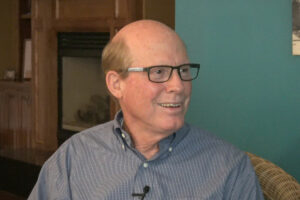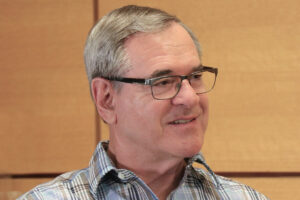Topic: Minimum desirable stream flow

Interview of Ken Grotewiel, December 5, 2019
Interviewed by Rex Buchanan
In this 2019 oral history interview, former Representative Ken Grotewiel recalls learning about the state and its urban/rural divide in addressing water issues. He found that these issues were not generally decided on a partisan basis. While representing Wichita in the Kansas House of Representatives, Grotewiel developed a good working relationship with Carl Dean Holmes, a Republican House member from western Kansas, especially on water issues, when they served together on the House Energy and Natural Resources Committee. Although Grotewiel had a reputation as a liberal environmentalist, he views his approach as that of a pragmatist. Among the Show Morewater issues addressed during his service in the House were purchasing storage in federal reservoirs that involved “minimum desirable stream flows,” irrigation, “water rights” that can affect streams, and the interbasin transfer of water. Grotewiel describes in some detail the challenges of passing legislation to fund the State Water Plan; legislation strongly opposed by farm groups and irrigators. He sites approval of water plan funding as an example of bipartisan cooperation and as the most significant accomplishment during his time in the Legislature. By the time he was appointed by Governor Sebelius to be Assistant Director of the Kansas Water Office in 2002, he noted considerable breakdown of civility in the Legislature. Among issues Grotewiel worked on during his service in the Water Office were use of federal money to purchase water rights along the Arkansas River and the purchase of land to protect the Equus Beds aquifer along with resisting the Legislature's diversion of Water Plan moneys for other purposes. Show Less

Interview of David Pope, September 19, 2019
Interviewed by Rex Buchanan
In this 2019 oral history interview, David Pope describes how the awareness of declining water levels in the High Plains Aquifers in Kansas led to efforts to support wise use and responsible management of groundwater in the state. He describes being hired to address groundwater issues from the local perspective and how he was involved in the creation the Groundwater Management District (GMD) in southwest Kansas. As Assistant Chief Engineer of the Department of Agriculture’s Division of Water Resources and later Chief Engineer, Pope was involved in a state policy limiting new groundwater development, referred to as planned Show Moredepletion, along with efforts to develop regulations on water management to replace the prior ad hoc approach. Pope discusses his dealings the U.S. Army Corps of Engineers in assuring minimal desirable streamflow to satisfy municipal and industrial water users along with conservation and recreation interests. He describes the complex interplay of surface and groundwater use policies which became a politically highly charged issue in addressing the Cheyenne Bottoms wetlands issue, Pope explains how the water law premise of "first in time, first in right" has been modified with amendments and regulations that require the filing of water rights, development of conservation plans to assure the beneficial use of water, mandatory metering of water use, and closure of areas for new water rights, all based on hydrologic studies. He concludes that although some GMDs have not tackled long-term depletion problems in western Kansas, two districts have adopted successful strategies: safe yield rules adopted by Groundwater Management District No. 2, and the creation of the Local Enhanced Management Area (LEMA) in Sheridan County to regulate irrigation. Pope describes those successes and speculates on why others have not been as successful. Show Less
